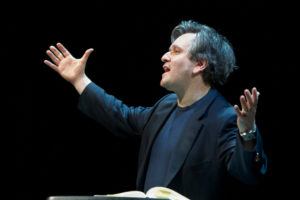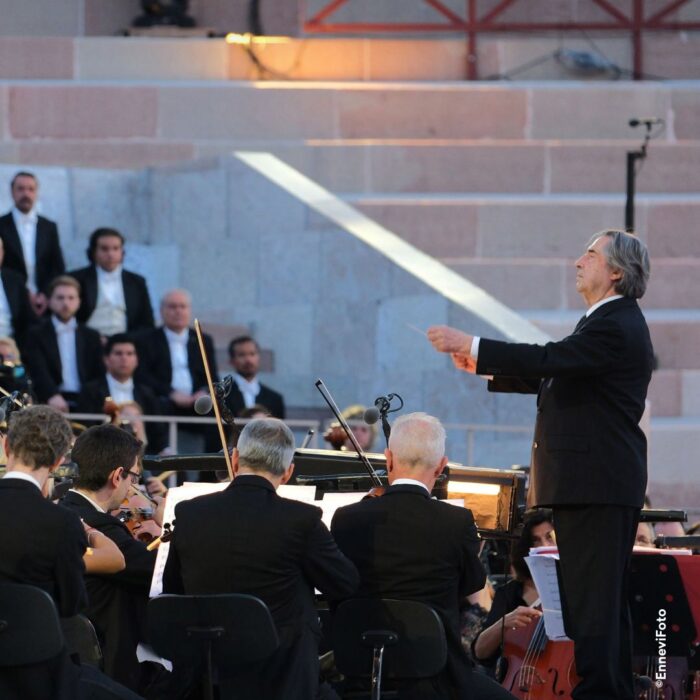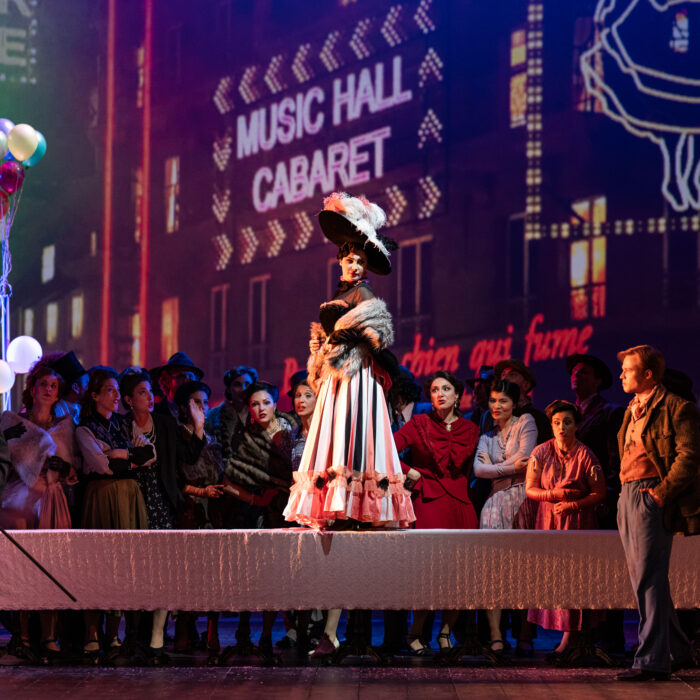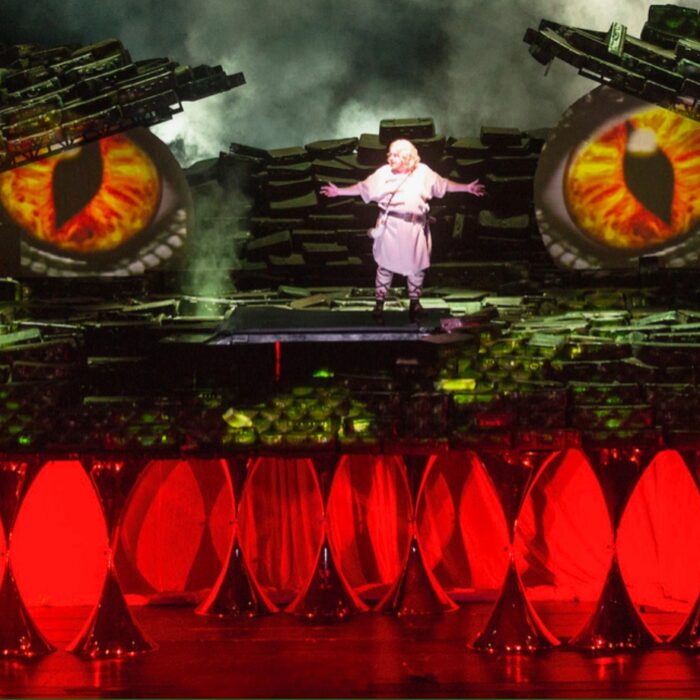
Royal Opera House 2023-24 Review: Celebrating 22 Years of Sir Antonio Pappano
The Stars Shine in Celebration of Legendary Conductor
By Mike HardyA truly packed house, a cast of operatic luminaries and a program of works chosen and compiled by Maestro Pappano himself; a Gala, fit for a KING, surely? Which is just as well because His Royal Highness King Charles III was in the audience as a truly surprise guest of honor, courtesy of a massive covert security operation that even rendered the cast themselves clueless as to the King’s attendance, right up until 20 minutes before curtain-up! The rest of us were only made aware of a Royal presence when Pappano struck up the orchestra with the National Anthem, “God save the King” at the start of the evening.
The Monarch, who has been Patron of the Royal Opera House since 2009 and President of the Royal Ballet since 2003, was welcomed on stage at the cessation of the evenings proceedings by the conductor, where he was loudly cheered by all. His Majesty appeared most pleased, as well he might.
This was a night of celebration, a show of adulation and affection for the man who has been described as “the best thing that has happened to the Royal Opera in its lifetime.” Sir Antonio Pappano has served an exemplary 22 years as music director, conducting over 700 performances at Covent Garden, and guiding and mentoring some of today’s biggest names and rising stars, both.
Surprisingly, there was no Wagner on the menu, and the only Mozart was the “Marriage of Figaro” with which the Maestro elected to open the evening’s performance.
Amongst a star studded cast, there were no solo arias, Russian Mezzo Aigul Akhmetshina and British baritone Huw Montague Rendall getting the vocal proceedings underway with “Dunque io son” from Rossini’s “Barber of Seville.” Rendall, described by “Le Figaro” as “The Pelléas of his generation,” was both utterly charming, charismatic, and sonorously rich in voice. Akhmetshina, although suffering from a virus, displayed amazing versatility and a most athletic coloratura in this offering.
This was preceded by established artists, Lisette Oropesa and Carlos Álvarez, both in fine fettle, who performed a comedic turn in Donizetti’s “Pronta io son” from “Don Pasquale.”
Not to be outdone in the comedy stakes, Jonas Kaufmann and Diana Damrau got to properly ham it up with the pocket watch duet, “Dieser Anstand, so manierlich” from Johann Strauss’s “Die Fledermaus” although Kaufmann appeared to be showing caution with his voice after his recent bout of the laryngitis that forced him to cancel a concert performance in Munich, little more than a week prior to this engagement.
The chorus of the Royal Opera House themselves were next up, performing a rousing and glorious rendition of Verdi’s “Va, Pensioro” from “Nabucco.” If there is a finer chorus in the world then I’d pay dearly to hear it.
MORE Verdi next, with the famous “Bella figlia dell’amore” quartet from “Rigoletto.” This time, Aigul Akhmethshina being joined by American soprano Nadine Sierra, Spanish tenor Xabier Anduaga and Mongolian baritone, Amartuvshin Enkhbat. This was a magical quartet with Anduaga in particular being a bright, polished, incisive force.
One of the evening’s highlights, for me at least, followed; a breathtakingly beautiful “C’est toi, mon pere” from Massenet’s “Thais,” performed by Albanian soprano Ermonela Jaho and Canadian Bass Baritone Gerald Finley. Jaho, in a white, flowing, ethereal ensemble looked like an angel, and she sure sang like one. Beautifully nuanced, coloured passages and a soaring controlled upper register made for a most emotive and beguiling piece.
MORE Verdi, with American-Canadian Soprano Sondra Radvanovsky and British-Italian tenor Freddie de Tomasso with “Teco io sto” from “Un Ballo in maschera.” Radvanovsky seems to get better with age, to my ear, accomplishing amazing feats of vocal gymnastics; a soaring, piercing resonance at one turn, exquisite pianissimos the next. De Tommaso contrastingly displays a stunning innate Italianate quality combined with a dark, rich, baritonal flavour. These are remarkable gifts that bely his youth.
Leading to the Interval, Welsh powerhouse Sir Bryn Terfel, accompanied here by the very promising Jette Parker artist Michael Gibson, performs “Te Deum” from Puccini’s “Tosca,” alongside the Royal Opera House chorus. Terfel positively oozes malevolence in this role, a finer Scarpia you will struggle to find.
After the break, MORE Verdi with “I Lombardi alla prima crociata”: firstly, the prelude performed by the remarkable Bulgarian violinist and conductor, Vasko Vasilev, a long standing work colleague and close associate of Pappano. His playing was majestic and he was later singled out by the Maestro to receive audience applause. After the prelude, Freddie de Tommaso with Ermonela Jaho and South Korean bass Insung Sim performed the “Qui posa il fianco” trio. Here, de Tommaso was more dominant, singing a more commanding line and showing off his dramatical skills, ably assisted by Jaho and a deep, velvet dark Sim.
“Rigoletto” next, “Signor ne principe” with Nadine Sierra, Xabier Anduaga, Jeremy White, Michael Gibson and another Jette Parker artist, mezzo-soprano Veena Akama-Makia. Again, Anduaga showing why he is being widely hailed as the ‘next great thing’. He has a supremely gifted lyric voice that soars effortlessly. Moreover, he has a commanding stage presence. Alongside Sierra, herself well known in the role here of Gilda, and also widely acknowledged for her sublime vocal gifts and musicality, together they created an irresistible force.
Another comedic interlude “Don Pasquele” next, from “Donizetti.” Huw Montague Rendall and Carlos Alvarez performing “Cheti, cheti, immantinente” with aplomb. Vocally commanding, reverberant, at times mellifluous, and totally chucklesome.
The final offering from Verdi was in the form of “La Forza del destino” firstly with Jonas Kaufmann and Amartuvshin Enkhbat in “Le minaccie, i fieri accenti” and then in the trio “Non imprecare umiliati” with Sondra Radvanovsky and Insung Sim. Kaufmann performed this role on this stage to huge, critical acclaim in 2019. His glorious, unique honeyed phrasing was still in evidence here, but it was also clear that he was still suffering from the malady that had rendered him inoperable mere days before this performance. I saw him turn his head and cough twice during his interactions here. Again, Radvanovsky was flawless, with Sim and Enkhbat providing stellar support.
It would be impossible to honour such a luminary as Pappano without heaping commensurate praise on those who enact his creativity and bear the fruit of his teachings. The chorus I have already alluded to, and they got to shine further in Leoncavallo’s “Andiam….Don din don’’ from “Pagliacci.” This ensemble really is the lifeblood of the opera house and the phrase, “acting and moving as one” was never more appropriate than here. Firstly, though, the orchestra themselves got to revel in the second Puccini offering of the evening, the Intermezzo from “Manon Lescaut.” This most moving rendition exemplified to perfection the seemingly unique gifts that Pappano possesses in being able elicit such beauty and that “something extra” from his orchestra. The audience response at the end suggested they thought likewise.
The penultimate performance was given to Richard Strauss and “Der Rosenkavalier.” Lisette Oropessa, Diana Damrau and Aigul Akhmetshina, along with Gerald Finley, sang “Marie Theres’…..Hab mir’s gelobt.” This is a work Pappano hasn’t conducted in a quarter of a century, and he perhaps chose this to illustrate the talents of the girls over any personal preference for the piece.
The finale, was the “Guillaume Tell” Finale. Lisette Oropesa, Jette Parker artist Sarah Dufresne, Veena Akama-Makia, Xabier Anduaga, Gerald Finley, Insung Sim, Jeremy White and the Royal Opera Chorus got to close proceedings in style. Gerald Finley really did save his best ‘til last here, sonorous, rich and resonant with his entirely appropriate “Tout change et grandit en ces lieux!”: “Everything changes and grows here!”
The performances were interspersed with narration and presentation from British Broadcaster Petroc Trelawny and pre-filmed plaudits from everyone from the Chorus, to stage directors, producers to industry big-wigs were shown, via drop down projector screen. It is clear from my own personal interactions with performers and artists, that more than anything, Pappano is a “singer’s conductor.” The love, respect and universal adulation for him by anyone in the classical music world is, genuinely palpable.
I have written previously that Maestro Pappano, more than any other conductor, seems able to coax, accentuate, and present passages with greater nuances that augment and heighten the emotions. I have witnessed performances, (such as “Turandot” at the Royal Opera House), where he manages to elucidate and interpret scores in a way that makes it infinitely superior to any other performance I have witnessed. Whilst the Maestro now moves on to become the chief conductor of the London Symphony Orchestra, it is unequivocal that he will be welcomed back at the Opera House by, (hopefully), frequent invitation.
In 1992, he was named music director the Théâtre Royal de la Monnaie in Brussels where he enjoyed a highly successful 10 years. When he left to take up his role at the Royal Opera House, he was he was showered with red roses and presented with gifts from the orchestra at his farewell concert. A notable critic wrote at the time: “if the Belgians know what they are losing, the English have only a tiny idea of what they are gaining.”
For the ROH and opera fans everywhere, it is all too sadly clear what they are losing.



